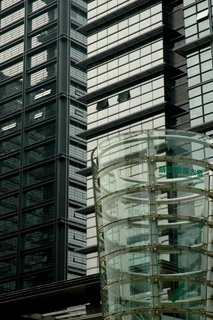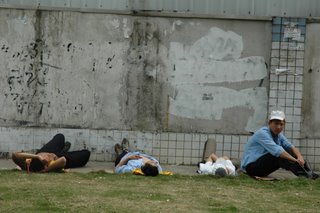
I just returned from a summer spent studying in Beijing. It was a wonderful experience, a chance to reconnect with a place and people I love.
However, I found that the city had changed a lot since the last time I spent any real time there (the winter and spring of 2001).
Not only are Beijing's historic hutongs targets for destruction; so too are its dull, tile and cement apartment complexes of the 1980s and 1990s. Styles are eating styles almost as fast as new ones can be generated.
If Marx were alive, he would find a new applicability for his oft-quoted description of changing productive relations: "All fixed, fast-frozen relationships . . . are swept away, all new-formed ones become antiquated before they can ossify. All that is solid melts into air."
Beijing is in a hubbub that is unlikely to subside until after 2008, if then.
Development in terms of better sewage systems, more orderly roads, bigger hospitals, and, well, architecture that is pleasing to the eye is a good thing. But all this bustle, all these tons of earth moved and sheets of glass hung, all the labor of all Beijing's migrant workers, is directed at one group: the upper middle class and the very, very rich. Small shop owners, workers and taxi drivers are being pushed out beyond the outer ring roads of the city; the bright lights and trendily exposed steel girders rising up everywhere are not for them.
Meanwhile, as the
Western and
Chinese media and internet forums have noted, places with stories and unique forms of community life are disappearing.
Nor, generally, is some new "look" forming, some distinctively "Beijing" way of living it large. The West, especially the United States of shopping malls and strip malls appears to be the model (though some areas of Beijing, it should be noted, have been more adventurous--the eerily beautiful
SOHO development near Dawanglu, for example). Many people I spoke to put things in terms of reaching some plateau, of being--some day--just like New York City (another city that is destroying much of its working class life in favor of yuppie glitz).
Looking at the old
propaganda posters from the 1960s and 1970s for sale to tourists, I was reminded how China once viewed itself as a part of another trajectory---that of the "Third World" and its struggles for liberation. Where photographs of European or American business people now look down from billboards advertising luxury condominiums, silkscreened, flatly colored and boldly outlined, muscular Africans, Middle Easterners and Asians once joined arms to smash the United States and Soviet Union or to wave the Chairman's collected writings.
It is perhaps unwise to romanticize Maoist anti-imperialism, or even the calm, heartfelt solidarity of Zhou Enlai and the expressions of brotherhood shown at the Bandung Conference. In addition to the cruelty of some the causes China backed in those days---Pol Pot's Khmer Rouge, for one---many of the country's foreign policy flourishes were motivated more by old-school realpolitik than high ideals and, when push came to shove, naked interests won out over principle.
Nonetheless, when I see rapidly developing Brazil, India and China each pursuing their own version of the "American Dream" (and America itself driving the dream off a cliff) I worry that a chance at something greater has been lost.
 There is an excellent article in this month's issue of Mother Jones by Charles Bowden on the passage of illegal immigrants into the United States--the best I've read, but then I'm no expert on the topic (unfortunately, you'll have to buy the magazine at new stands, as it's not available online).
There is an excellent article in this month's issue of Mother Jones by Charles Bowden on the passage of illegal immigrants into the United States--the best I've read, but then I'm no expert on the topic (unfortunately, you'll have to buy the magazine at new stands, as it's not available online). 











